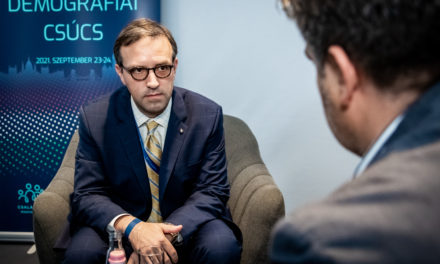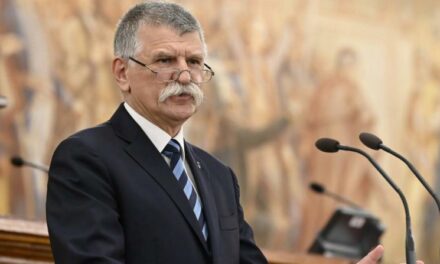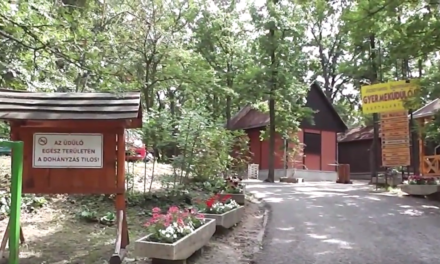dpa (Deutsche Presse Agentur) is an impartial news agency, the German equivalent of the Hungarian MTI. Its code of ethics states that only news based on facts may be published, so that readers can form their own opinions without being influenced. dpa does not manipulate. Journalists must write in such a way that what they say fully complies with this ethical position and that all the information they use is retrievable. The strict regulations can be deviated from in certain cases. A loophole only opens for socially important conflict topics, but the dpa immediately defends itself: in such cases, it does not have enough information for fact-checking.
For example, you did not hear and/or read Viktor Orbán's annual review speech. They don't know Hungarian at the company, so they relied on their reliable correspondent in Budapest. And the reporter found the most important element of the one-hour speech to be the sentence that was not even spoken. Namely, that Hungary might leave the European Union. He built his coverage on this, and this became the headline, which he supplemented for the sake of clarity with the fact that although Viktor Orbán has made sharp attacks against the "Brussels bureaucrats" many times, threats related to withdrawal have not been in his toolbox so far.
In the text, they refined this a little, putting some sentences that were actually spoken in quotation marks. However, the emphasis was on the tolerance demand of the "right-wing nationalist" Orbán, which the coverage evaluated as an ultimatum. If Brussels and Berlin do not allow, then "our paths will diverge" - they put their own version in the mouth of the Hungarian Prime Minister. There was no mention of an ultimatum in the speech, just a simple offer of tolerance to accept each other as we are. Hungary does not want to become like Western Europe, and the Hungarians do not expect the West to adopt their refugee and family policies either.
"The European Union only has a future if we can stay together despite the growing cultural alienation. For our part, we want to keep the European Union together," Viktor Orbán literally said. But it seems that not only our language, but also our way of thinking is very different. In the Hungarian cultural tradition, tolerance and acceptance of otherness instead of coercion by power, i.e. true tolerance, has always been considered a basic value.
It was as if nothing else had been said in this wide-ranging speech worthy of a statesman, which must be listened to several times in order for all its layers to come through and become understandable. Although the prime minister primarily evaluated the economic results and domestic political battles of the past years, this was not merely a year evaluation or campaign opening speech. The politicians in Brussels could also have listened to realize the real dangers that threaten our continent.
The Western Balkans and Ukraine are a barrel of gunpowder, the migration crisis is not abating, the EU energy policy is generating an energy crisis, inflation, and the pandemic is still around our necks. The leaders of Europe do not see, or do not want to see, that the Christian future of Europe, even the future of the plain, is in danger. The head of government not only comprehensively outlined the set of problems divided into four points, but also offered solutions, using the "Hungarian model" as an example.
dpa is a large news agency, with more than a thousand occasional or permanent correspondents in foreign locations, including in Budapest. The correspondent finished the material that evening, and dpa distributed the finished material to all its media partners by Sunday morning. They took it over and supplemented it according to their habitus, but they referred to the source, the news agency, out of caution. The text was published by dpa without mentioning the name of the author. Gregor Mayer, who maintains good relations with MÚOSZ and the Independent Media Center and is extremely anti-Orbán, usually reports on Hungarian affairs.
dpa was not particularly interested in the speech itself, it was only apropos, another "proof" of the anti-EU nature of the Prime Minister, who is capable of acting against his own people, since - as described in the article - the vast majority of Hungarians are committed to the union. They were not interested in the speech, but what could be gleaned from it to justify the expected judgment of the Court of Justice of the European Union on February 16.
The court will announce a verdict on whether it is possible to tie the financial resources belonging to the member states to political and ideological conditions. Judges connected to the network are not now racking their brains over the verdict, it was made a long time ago. Accepting injustice and lawlessness, well, that required the media's tailwind. The latest fake news against the Hungarians, specifically against the person of Viktor Orbán.
Our true war with the German media could enter the next phase if the Hungarian State or a brave, enterprising lawyer filed a lawsuit against dpa for falsifying news, as Zsolt Petry did last spring. At that time, the rainbow family campaign was running all over Europe, and the goalkeeper of the Hungarian national team, Péter Gulácsi, campaigned with an icon painted on his palm in support of the sensitizing, political campaign.
We remember that Petry gave an interview to the Magyar Nemzet, in which he defended Gulácsi, since according to him, he did nothing more than express his opinion on something. "I don't know what could have prompted Péter to stand up for homosexuals, transvestites and people with other gender identities. I'm sure I wouldn't have stirred up tempers in his place," he said verbatim to Nemzet, which the dpa correspondent had already reshaped a bit, to the point that it was enough for the goalkeeper coach to be fired by the Berlin sports club.
"Petry made xenophobic and anti-migration statements, objected to Gulácsi playing in Leipzig, an association that supports gay marriage." Petry sued the German news agency for defamation and falsification of news, which he won at first instance in the Frankfurt court. Pursuant to the verdict, all media partners of dpa had to remove articles disparaging Petry from their online platforms.
Because we do not gain much by sending letters of protest to the media in Germany, to local or national newspapers that spread fake news. They will not apologize, because the news is sacred and opinions are free. In the best case, they will publish a few lines of it as readers' letters according to their own taste, but such letters usually end up in the trash can. And the false reporting circulates indelibly on the world wide web, even years later, as an elegant piece of evidence. Because who will remember what the truth was?
Our true war with the German media could enter its next phase.
Irén Rab is a historian
Source: magyarhirlap.hu












